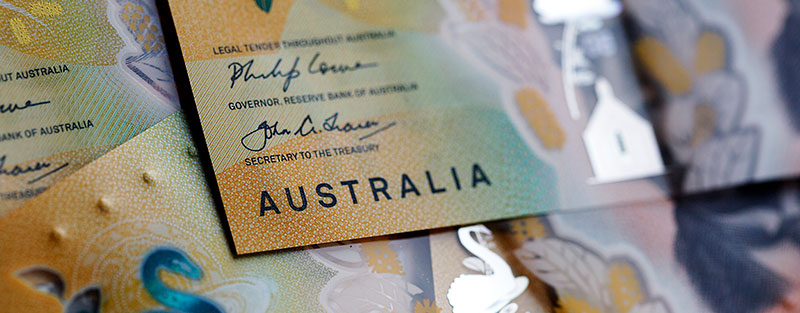Commentaires
Australia
03 mars 2022

On February 21st, Australia finally reopened its border to international travellers after two years of being fully closed. One of the strictest travel bans of the COVID era, at one point more than 30,000 Australians were unable to access the country due to the limited amount of people allowed to return home every month.[1] The Australian government was not afraid to make a public example out of a certain tennis player to show how no exceptions would be made. Nonetheless, it slowly started showing signs in 2022 that it would shift from its strict zero-COVID strategy and instead hinted that it would follow the steps taken by the UK and other western countries to figure out how to live with the virus.
One of the biggest casualties of its zero-COVID strategy will be the end of its streak as the longest period of economic growth in modern history. Australia was able to navigate the Asian financial crisis, the dot-com bubble, the great recession of 2008, and a once-in-a-generation mining boom that ended in 2014 without experiencing a recession. Even after 30 years of continued growth, it took an almost complete shutdown of international trade to pull the Australian economy back into a recession. For the record, it was still a less severe downturn than almost every single country in the world except China experienced.[2]
Despite the end of this streak, Australia retains most of the growth drivers of the last 30 years. The strength of its consumers remains in solid shape thanks to government support, upward wage pressure due to a labour shortage, significant household savings, and the safety of the strong pension benefits. Australia’s geographic location places them in a unique position to benefit from the growth in Asian consumer spending power. Its abundant natural resources, especially its mining industry, are resilient and should benefit from an inflationary environment, and what many expect to be the start of a commodity super cycle.[3]
People more pessimistic about the Australian economy will usually point to its dependence on China as a trading partner. The trade war between the two nations was escalated to the World Trade Organization (WTO) in 2021 over tariffs that China implemented in 2020 on Australian products such as barley, coal, cotton, logs, meat and wine. This was the result of Australia’s previous criticism of China’s human rights record and the decision to ban Huawei from the country, in addition to other grievances formulated toward the Chinese government. While it is true that China always represents a risk to the Australian economy, representing roughly 40% of their good exports, this misses the dependence China has on some Australian commodities. Unsurprisingly, their largest export, iron ore, was not part of the tariffs China imposed on Australia. The Chinese government knew very well how difficult it is to find other sources of the same scale as Australia. Furthermore, as China was facing a coal shortage in October, it resumed letting Australian coal ships access their port after being banned since December 2020.[4] Although, strong political rhetoric between the two countries is expected to continue, it is unlikely that economic relations will get much worse in the short term.
It is also worth noting that the country’s reputation as being an economy dependent on natural resources is often exaggerated. Like Canada, Australia’s stock markets tend to move along with commodity prices. But the reality is that much like other developed markets, Australia’s economy is dominated by the service sector. Representing more than 70% of GDP, almost 80% of its labour force and 40% of its export earnings, its expertise range from energy and mining-related services to banking and fintech.[5] Outside of the tourism industry, the impact of the travel ban and other COVID measures had a limited economic impact as evidenced by the unemployment rate increasing only 1.45% between 2019 and 2020.[6]
Global Alpha enjoys the exposure to various names in the Australian services industry.
ALS Ltd (ALQ AU)
Based in Brisbane, ALS is one of the world’s largest testing providers of laboratory analysis services, offering assessment, inspection, certification and verification. They operate out of 350 sites across 65 countries and across three segments: life sciences, commodities and industrials. The new management is in the process of solving many business inefficiencies to improve margins and their growth profile to be more sustainable. ALS should be a clear winner from the exploding demand for commodities and the new project development that will result from it.
Bravura Solutions Ltd. (BVS AU)
Bravura Solutions provides web-based software products and SaaS to the wealth management and funds administration industries, primarily in the Asia-Pacific and European regions. With over 70 bluechip clients and $2.3t trillion in assets managed through its systems, it is a market leader with a sticky product that participates in an industry with increasing regulation and the need for outsourcing.
Smartgroup Corp Ltd. (SIQ AU)
Founded in 2001, Smartgroup is a leading provider of salary packaging, fleet management, share plan administration and payroll services based in Sydney. Quite popular in Australia, the concept of salary packaging involves an arrangement between employer and employees where certain items or benefits can be paid for out of your pre-tax salary, reducing taxable income and therefore tax payable. Their business model involves charging employers an admin fee for outsourcing this for an average of AUD$200 per employee every year. Their client base mostly includes entities that benefit from not having to manage this internally, such as not-for-profit, hospitals, governments, and universities.
Australia is a relatively small weight within our developed market benchmarks but a mix of its exposure to the Asian consumer, strong expected consumer and corporate demand, and a Federal election in May that could lead to more deficit expanding policies, should result in outsized growth in the years ahead. We are quite satisfied with the varied exposure we currently have there.
[1] Australia is ending its zero-covid strategy | The Economist
[2] Just four countries fared better than Australia (afr.com)
[3] June 10th 2021 GA commentary – Hot commodity
[4] China accepts stranded Australian coal as shortages bite, but unofficial ban on new orders remains (afr.com)
[5] The importance of services trade to Australia | Australian Government Department of Foreign Affairs and Trade (dfat.gov.au)





